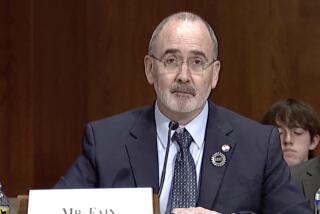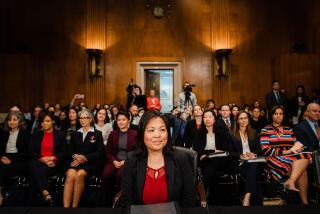Patt Morrison Asks: U.S. Secretary of Labor Hilda Solis
Ahigh school counselor in La Puente once told Hilda Solis’ mother that the girl really ought to forget about college and become a secretary. Well, so she has. Hilda Solis is the U.S. secretary of Labor. The daughter of factory workers and ardent union members became the first in her family to get a college education. She brought to D.C. a no-bones-about-it track record from the California Legislature, where she raised the minimum wage, raised the bar for worker protections and raised some hell for environmental laws.
This Labor Day, as unions dwindle in membership but increase as a topic in the public discourse, she puts on her capital-S Secretary Solis thinking cap.
You’re wearing one of Frances Perkins’ hats in your picture. She was secretary of Labor for Franklin D. Roosevelt and the first woman in a Cabinet. You’re the first Latina. Why is she a heroine of yours?
She broke the mold. She engaged with things outside of the bubble, as they say here in D.C. She brought back policies from what she learned in the field, put them in legislation and, as a result, we have wonderful protections in the workplace.
And I work very much the same way. I’ll go to the fields in Washington state. I’ll go to the sweatshops in L.A. or New York. I’ll visit people on assembly lines, in-home healthcare workers. I really believe in that.
At times you feel like you’re the only voice speaking out to improve the working conditions of people, whether it’s to be able to collectively bargain, to get adequate pay, to know that you can come home safe out of a coal mine.
We take for granted much of what we have, and if we erode those protections, we’re going to see more casualties and more fatalities. People have to be reminded that unions played a very historic role in our economy. If you didn’t have unions, you wouldn’t have Saturdays and Sundays [off]; you wouldn’t be paid a minimum wage, be guaranteed paid overtime and sick leave and a pension. Believe it or not, we still have these issues come up -- [businesses] still would like to take advantage.
Are you accomplishing what you want?
When I left Congress to take this position, I had no idea of [its] enormous reach. I can fund programs and implement and enforce laws -- and being able to help young people to give them a chance, that is so fulfilling to me.
Only about 7% of private sector jobs are unionized. The workforce includes contractors, part-timers, people who work at home and hold multiple jobs. How do you unionize a workforce like that? Do you even need to?
I don’t know that every sector of the job market has to be union. If my competitor has a union business and I want to keep my employees happy, I want productivity up -- maybe I don’t need a union but practices learned from labor unions have been carried over. You see it in Silicon Valley: workplace flexibility, paid medical and family leave. All these advances started at the bargaining table.
Public employee unions have been hammered in Wisconsin and elsewhere. Mayor Antonio Villaraigosa, a union supporter, has taken issue with the teachers union. Is the burden now on unions to be more flexible about issues like pensions?
Again, there is a give and take. Look what happened in the automobile industry. The United Auto Workers had to sit down with management. We see it with teachers, firefighters, police officers, healthcare providers. We have to do a better information campaign about why pension plans were negotiated [the way they were].
[In] an economic crisis, you’ve got to switch gears. It doesn’t mean you take advantage of employees. We want to make sure people have the ability to have pensions; let’s do it together at the table because we’ve been working together for a century.
The administration’s mission is job creation. Critics say government can’t create jobs. What can your department do?
We’re helping to incentivize investments through our jobs training programs in renewable energy and healthcare and IT, sectors we know are growing. California is the perfect place to begin that discussion. People who’ve lost their jobs in construction can do retrofitting and solar panel installation, turbine engines, windmills. People who lost jobs that are never going to come back are entering fields where you see growth. Some folks on the other side of the aisle don’t necessarily agree with me, but we need energy independence and that’s a part of it.
You also want to bring back manufacturing . But you can’t just re-create what was there, right?
Let’s bring back those positions [from overseas that] provide services in banking or communications. AT&T did it. Customer satisfaction rates very high, so the bottom line is, if that’s what’s going to keep them competitive, then that’s what a business is going to do. Jobs are coming back here because we can actually minimize time for production and cut [shipping] costs.
Unemployment and labor needs seem mismatched. Agricultural jobs go begging, and high-tech companies are asking for more visas to bring in talent from overseas.
Some employers would like to keep the cost of paying employees very low. I believe they’re misusing the [visa] program if that’s what their priority or objective is. These programs are not meant to supplant American workers. We have unemployed who can easily fit into some of these jobs or be retrained.We’re making investments [in] that workforce that’s available here.
What about the lower end of the wage spectrum, farm workers?
I’m not against implementing H-2A programs [which issue temporary visas for agricultural workers], but many people have abused this program. Our priority: to see if we can get U.S. workers who might want to take the jobs that pay $9, $10, $15 an hour. If not, then make sure the employer follows some guidelines: adequate transportation and decent housing. Before, they put 10 or 12 people in a shed. These things still happen today, and that’s why we have to have good standards and rules and make sure contractors who bring in these folks aren’t hurting farmers who are playing by the rules and paying the right wages. .
You come from a stalwart pro-union and pro-immigrant back-ground. I’ve read that Cesar Chavez complained that people coming here illegally were breaking strikes and undercutting the United Farm Workers’ ability to negotiate.
I can understand. Undocumented dry-wall construction workers -- the employer’s going to be able to pay them maybe $5 an hour as opposed to $11 or $12. I get that. I would rather have these people understand their rights, what the standard of pay should be. We have a lot of people here who remain in the shadows and don’t understand there’s a law that you have to be paid the minimum wage. We get these complaints all the time, not just in the field [but] the garment district, hotel, motel areas, and not just Latino but Asian.
When the economy’s bad, someone’s always willing to work for five cents less an hour.
Oh, it’s not five cents, it’s $5!
You had concerns years ago about NAFTA. Now Mexican trucks are getting long-haul access to the U.S. and the Teamsters have vigorously opposed that.
[Transportation Secretary] Ray LaHood is doing the right thing: Make sure we have safety and protection in place because the country is being penalized when we are not allowing for those goods and services to be transported. These were agreements signed by the previous administration, by the way.
What are you doing for Labor Day?
I’m going to be with the president in Detroit. It’s my week!
In L.A. we say Latino. In D.C. they say Hispanic. Have you had any luck converting them?
Not all of them! The president, in his different speeches, he’ll say Latino. As you know, a lot of good things start in California and L.A. and make their way [to Washington]!
This interview is edited and excerpted from a longer taped transcript. An archive of past interviews is at latimes.com/pattasks.
More to Read
A cure for the common opinion
Get thought-provoking perspectives with our weekly newsletter.
You may occasionally receive promotional content from the Los Angeles Times.







